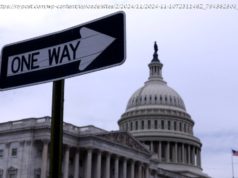The Supreme Court on Thursday made it harder for the federal government to police water pollution in a decision that strips protections from wetlands that are isolated from larger.
The Supreme Court on Thursday made it harder for the federal government to police water pollution in a decision that strips protections from wetlands that are isolated from larger bodies of water, per the AP. It’s the second decision in as many years in which a conservative majority of the court narrowed the reach of environmental regulations. The justices boosted property rights over concerns about clean water in a ruling in favor of an Idaho couple who sought to build a house near Priest Lake in the state’s panhandle. Chantell and Michael Sackett objected when federal officials identified a soggy portion of the property as a wetlands that required them to get a permit before building.
By a 5-4 vote, the court said in an opinion by Justice Samuel Alito that wetlands can only be regulated under the Clean Water Act if they have a “continuous surface connection” to larger, regulated bodies of water.






